FYFFI: Fifty Years of the Fight for Inclusion
2025 marks the 50th anniversary of the first Gay Theatre Festival in Britain
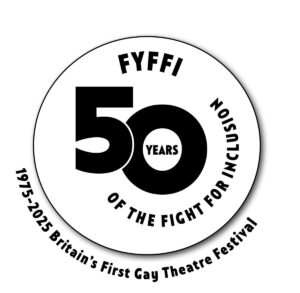
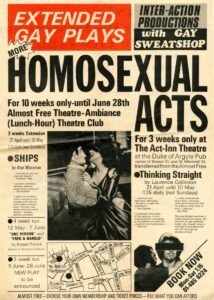
Called Homosexual Acts it took place in 1975 at the Almost Free Theatre and later at the ICA. In 2015 we marked its 40th anniversary with a Gala at the Arcola Theatre led by Alan Wakeman one of the founders of the ’75 festival and of Gay Sweatshop.
Over the course of 2026 we will be revisiting the history of Lesbian and Gay performance from the 1970s and 80s, rediscovering lost and little-known scripts through readings and workshops, staging a major exhibition (opens Nov 2025) and a Symposium (7th and 8th Nov), interviews and conversations, even commissioning new work, all in conjunction with our partners London Performance Studios
We started on 19th July and 26th July with two
Playreading Marathons
where you could take part in reading or sit and listen to and then discuss and array of LGBTQ+ plays from the 1960s, 70s and 80s. See here for more details
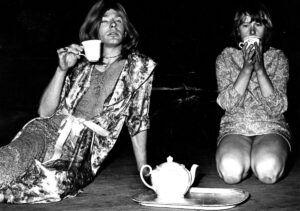
Son of a Gun, Guy Holland, Tasha Fairbanks, 1977
First off in 2025 though, we hosted an event celebrating the legendary Bloolips radical drag company in an event at Hackney Archives called Bloolips: Living Leg-Ends Revisited in the redoubtable company of Lavinia Co-op, reflecting on this fabled show forty years on.
The event took place at Hackney Archives in Dalston on Thursday 20th February 7 till 10pm.
Watch this space for documentation of that event and news of further Bloolips events.
Click here to find out more (Supported by London Borough of Hackney)
![]()
Previous events:
FYFFI 1 – 2024
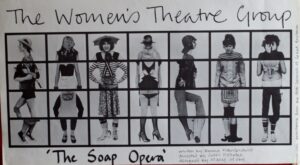
Radical Rediscovery: Feminist Theatre in Britain 1969-92
An exhibition by Unfinished Histories, curated by Susan Croft at London Performance Studios (LPS), the Penarth Centre, Penarth St, London SE15 1TR, 8th November to 15th December 2024
This new archival exhibition and events programme celebrated fifty years of alternative theatre made by women in the UK. The exhibition shared materials from the Unfinished Histories archive, and was curated by its co-founder Dr. Susan Croft.
To see press responses and the full captions please click here
The 1960s–1990s in Britain saw an explosion in alternative theatre made by women. Radical Rediscovery is an ambitious new survey that sets out to grapple with the nuanced and far-reaching social and political contexts behind this significant period of feminist theatre and practice.
Radical Rediscovery began with a series of vitrines displaying original ephemera, posters, documentation, and script excerpts from pioneering women that defined this period, including; Jane Arden (1960s), Women’s Theatre Group (Sphinx Theatre), Hesitate and Demonstrate, Sadista Sisters, Beryl and The Perils, Sensible Footwear, and Theatre of Black Women (1980s). This was underscored throughout by the stalwart community theatre groups and activist networks that made this work possible, including Women in Entertainment, Women Live, and the Women’s Playhouse Trust.
The exhibition continued with two monitors sharing oral and visual excerpts of interviews from seminal women practitioners from the Unfinished Histories archive, including Sheila Allen, an original performer from Vagina Rex and The Gas Oven (1969) and now-psychotherapist Natasha Morgan, whose play Room (1981) featured in the exhibition in the form of an installation.
Radical Rediscovery marked the 50th anniversary of the UK’s first Women’s Theatre Festival, at Inter-Action’s Almost Free Theatre in 1973, taking this as a key historical moment in the development of women’s ability to make and access theatre. From here, three divergent aesthetic and political drives emerged: one which used performance as a way to explore women’s experience in order to challenge stereotypes and social attitudes, another more experimental drive focused on finding new forms to explore the dreams and desires of women, and a third primarily concerned with campaigning against the underrepresentation of women in key roles in British theatre.
This exhibition, hosted by London Performance Studios (LPS) and curated by Dr Susan Croft, crucially highlighted the complexity of performance devised by women during this period, foregrounding feminist theatre from then to now as a vital social barometer and vehicle for political and personal expression, particularly in times of social, cultural, and political instability.
If you would like to read the individual captions for the exhibition items you can do so here.
There was also an exhibition booklet with more contextual information available from LPS.
Radical Rediscovery: Feminist Theatre in Britain 1969-1992 was organised by Unfinished Histories and curated by Dr Susan Croft as part of the LPS Associate Artists Programme.
Then on Saturday 30th November: Feminist Theatre: Documenting The Past, Inspiring The Future
A symposium of talks, panel discussions and a long table that closed proceedings, the event brought together theatre makers, artists, thinkers, and archivists to explore the women’s and feminist theatre movement, from the 1960s through to the 1990s and into the present day. Participants included Professor Anna Furse; Paula Brown, producer of Women Live and Katrina Duncan of Women In Entertainment in the 80s; writer and performer Rose Collis; experimental theatre-maker Natasha Morgan, site-specific theatre artist Geraldine Pilgrim, Jill Drower, author of The Exploding Galaxy: Performance Art, LSD and Bent Coppers in the Sixties Counterculture, actress and co-founder of Blacktress Cherelle Skeete, Sudha Bhuchar, co-founder of Tamasha Theatre company, director and academic Olusola Oyeleye, and playwright and performer Léa des Garets. Discussions aimed to connect the exhibition content with contemporary practitioners engaging with similar questions today, asking what has been learnt, lost and gained during this time. The symposium consisted of panel talks exploring the Unfinished Histories archive, legacies of women’s and feminist practices in British alternative theatre, and key concerns around documenting and archiving fringe theatre. This was followed by a long table discussion, and culminated with a drinks reception.
Find out more here about what the event was.
And coming soon:
A selection of the plays featured in the exhibition will also be collated into a new compendium aptly titled Radical Rediscoveries, and published by Montez Press in March 2025. This will be the second publication in the Scores imprint, which publishes plays, scripts and performance texts co-commissioned by Montez Press and London Performance Studios.
Radical Rediscoveries: Performance texts from the Women’s Theatre Movement 1960 -1990
edited by Susan Croft
Slightly delayed but imminent, this collection will bring together six plays or performance scenarios, the majority never before published, with an extensive introduction by Susan Croft
Vagina Rex and the Gas Oven (1969) by Jane Arden
Go West, Young Woman! (1974) by Pam Gems
Minutes (1978) by Hesitate and Demonstrate
Ophelia (1979) by Melissa Murray
Room (1981) by Natasha Morgan
The Wind of Change (1987) by Winsome Pinnock
Watch this space or follow Montez Press for details of launch date when confirmed
The volume includes experimental performance texts and scores for innovative work by women, including work by Hesitate and Demonstrate and by Natasha Morgan‘s That’s Not It as well as Arden’s legendary and long out-of-print Vagina Rex and the Gas Oven
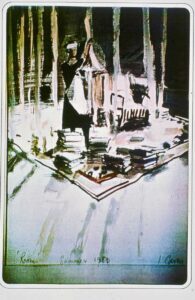
Jenny Carey’s design for That’s Not It’s Room (1981)
See here or below for more details of FYFFI 2024 and what we’ve done so far and here for how to get to London Performance Studios
What is FYFFI?
FYFFI is an initiative by Unfinished Histories project, in conjunction with London Performance Studios, to mark key moments in the struggles for change in British theatre in the post-war era. Through a rolling programme of events, FYFFI will mark three key anniversaries, celebrating moments that were both significant in themselves and in the changes that followed from them. They are:
- The first Women’s Theatre Festival in Britain in 1973-74
- The first Gay Theatre Festival in Britain in 1975
- The publication of Naseem Khan’s ground-breaking report The Arts Britain Ignores, by the Commission for Racial Equality in 1976
Each of these events marked a vital moment in the campaign to make theatre more inclusive in its representation of groups and experiences previously invisibilised, onstage through diversifying who was represented as playwrights and performers, offstage as directors, producers, board members, technicians… and as audiences, through making theatre more accessible across racial, class and gender divides.
FYFFI takes these key anniversaries as an opportunity to celebrate this vital history of women’s, LGBTQ+ and Black creativity, and the fight to change the make-up of our theatre look at how far we have come, where we are now, how debates on inclusion and diversity started and how they have moved in the intervening period, how organisations today like The Act for Change Campaign, Parents in Performing Arts, and others are addressing issues of exclusion by race, gender, class, sexual orientation, age, Dis/ability, caring responsibilities, nationality and religion. In a context where access to arts education is becoming increasingly exclusive it looks at how we can ensure that young women and non-binary people from socially marginalised communities, LGBTQ+ and global majority individuals can have access to the arts as both audiences and creative artists.
FYFFI celebrates a sustainable theatre, valuing the contribution of elders in a society and a theatre in love with the new, where a whole raft of earlier work has gone under-recognised and forgotten and acknowledges the impact of the alternative theatre movement in creating change in the mainstream. It celebrates earlier struggles for change and addresses what can be learnt from them, rediscovering and revisiting a rich repertoire of forgotten plays and neglected history and aims to share them with a new and diverse audience.
What will be happening?
Each year we will revisit some of the forgotten work from that period through workshops, playreadings, publication and will host an exhibition, guided tours and a symposium in the Autumn.
As ever we are keen to collect information, archive material, scripts and memories of the work of that period.
Get Involved
As we move into plans for 2025 and 2026 we are keen to find partners (groups, theatres, universities, researchers) to help amplify the work and take it further including putting on additional satellite events, within London and elsewhere. We are also keen to find volunteers to help with the work, as well as Patrons and supporters. If you would be interested in getting involved,
please email us.
Playreadings/ Workshops
In April and May we hosted our first community workshops exploring some of the plays from that period at London Performance Studios in South Bermondsey/Peckham.
They included Pam Gems’s Go West, Young Woman! (originally produced by The Women’s Company at the Roundhouse, 1974) and Melissa Murray’s Ophelia (Hormone Imbalance, 1979). We also revisited Jane Arden’s earlier Vagina Rex and the Gas Oven (1969), and Winsome Pinnock’s The Wind of Change (1987). See here for more information on FYFFI 2024
These all-day workshops explored the plays and their time and will feed into a playreading programme next year at LPS and elsewhere and fed into into the anthology of scripts.
Click here for details of Guided Walks exploring Women in the (Alternative) West End.
For details of how to get involved watch this space or email us.
